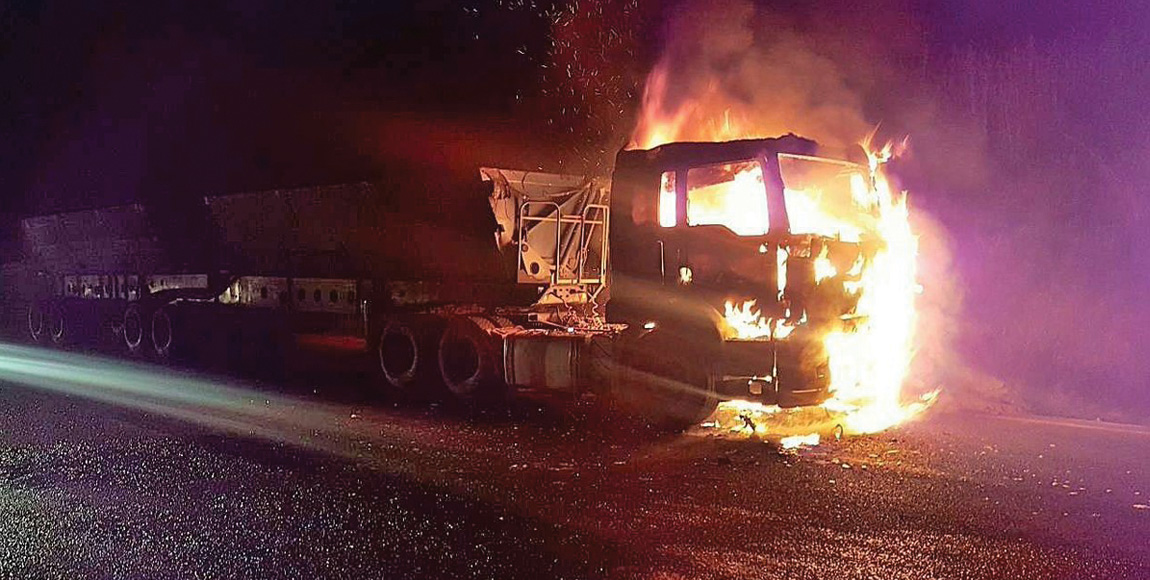Truck chaos continues

In the run up to Transport Month, attacks on truck drivers and vehicles in South Africa remained widespread, coinciding with a spate of in Johannesburg and Pretoria
October is Transport Month in South Africa and it would not be possible to acknowledge it without making mention of the impact that violent attacks have had on the country’s transport industry over the last year and, more specifically, the first two weeks of September.
It is believed that 213 drivers, mostly foreign nationals, have lost their lives and around 1 400 vehicles and cargoes have been burnt, damaged or destroyed at an estimated cost of R1,2 billion – or R3,3 million a day – over the last year.
From September 1 to 4 alone, 17 trucks were burnt in what marked the start of a planned strike by the self-appointed All Truck Drivers Forum (ATDF). The ATDF had distanced itself from the strike after a last-minute emergency meeting held in Durban on Saturday, August 31, which involved the organisation, the Positive Freight Solutions Forum (PFSF), Harbour Carriers and the South African Police Services (SAPS) among other bodies.
While the authorities later claimed that the attacks on drivers and trucks were sporadic and carried out by a few disgruntled criminal elements that were trying to force an agenda to bring the transport industry to a standstill, the devastation that was caused does not support the theory.
Attacks on trucks and drivers were widespread. Incidents took place along the N3 at Pietermaritzburg, Mooi River, Estcourt and near the Tugela Plaza before Van Reenen’s Pass; along the N2 at Port Shepstone, Paddock and Kokstad; and at the Olifantskop Pass on the N10, where a lone truck was torched, blocking access to traffic in both directions.
Other incidents occurred on the N12 near the Total Petroport; at Kuruman in the Northern Cape and at Piet Retief in KwaZulu Natal, where trucks were pulled off the road, parked and their keys taken by heavily armed gangs.
At Richards Bay in Northern KwaZulu Natal, 11 ATDF truck drivers were arrested for blocking access to the harbour by parking their trucks across the entrance. Other hotspots included Bethal in Mpumalanga; Bloemfontein in the Free State; and the N1 between Pretoria and Polokwane.
The efforts to cause chaos coincided with widespread xenophobic attacks in Johannesburg and Pretoria – initially directed at shops owned by foreign nationals – but which became free-for-all sprees of criminal looting and pilfering. Ten lives were lost, including those of two foreign nationals.
Damage caused by the burning and looting of shops and businesses in the two cities is expected to run into billions of rands. It is evident that the attacks on both trucks and foreign nationals’ businesses were interlinked, well planned and orchestrated simultaneously, although a lot of opportunists climbed on the bandwagon in both cases.
While there was a swift reaction and condemnation of the xenophobic attacks by Nigeria and Zambia, retaliatory attacks in those countries saw South African-owned businesses such as Shoprite, Pick n Pay and MTN targeted, along with the offices of the South African High Commissions.
What is the way forward from here? And how do we find a compromise that will satisfy all parties involved? From a trucking perspective, I think South African truck drivers will not want to cross borders into neighbouring countries for fear of retaliatory attacks. South African truck drivers have never been comfortable driving cross border, due to the harsh conditions to which they are subjected coupled with long periods of time spent away from home and families.
On the other hand, if we do not accede that South Africa should accept the presence of foreign drivers, we will need to be aware that such a move could isolate the country from regional trade into Africa and lead to reduced employment in the transport industry.
Fesarta has been a strong advocate for the principle that cross-border operators should be allowed to employ foreign nationals, provided they have legal work permits and the correct qualifications, as the amount of time they actually spend in South Africa is limited to a few days a month.
The xenophobic myth has no statistical support since South African drivers already have by far the largest share of local trucking jobs, with the ratio of foreign drivers to local drivers representing around five percent of truck driving jobs available in the country.
Published by
Mike Fitzmaurice
focusmagsa




